[Dec 2007, Volume 4 Quarterly Issue] Pdf File size - The IIPM Think ...
[Dec 2007, Volume 4 Quarterly Issue] Pdf File size - The IIPM Think ...
[Dec 2007, Volume 4 Quarterly Issue] Pdf File size - The IIPM Think ...
Create successful ePaper yourself
Turn your PDF publications into a flip-book with our unique Google optimized e-Paper software.
James Tooley,<br />
President,<br />
<strong>The</strong> Education Fund,<br />
Orient Global,Singapore<br />
Why Poor Parents Are Choosing ‘More Market, Less<br />
Government’ In Education And What We Should Do About It?<br />
"Freedom necessarily means<br />
that many things will be done<br />
which we do not like. Our<br />
faith in freedom does not rest<br />
on the foreseeable results in<br />
particular circumstances but<br />
in the belief that it will, on<br />
balance, release more forces<br />
for the good than the bad."<br />
-Friedrich Hayek<br />
I’ve moved to India because something<br />
extraordinary is happening<br />
in education, and I want to be a<br />
part of it. Most excitingly, it concerns<br />
the education of the less well-off in society,<br />
rather than the rich. <strong>The</strong> accepted<br />
wisdom says that the poor need<br />
governments to provide their education<br />
– in most developing countries,<br />
governments supplemented by hefty<br />
international aid. But government<br />
education for the poor in India isn’t<br />
working well. Visiting a government<br />
school for the poor here is not an edifying<br />
experience. Where there should<br />
be ten teachers, you’ll often only find<br />
two or three present. <strong>The</strong>y won’t all be<br />
teaching either. Children– bright-eyed,<br />
eager young children – will often be<br />
seating on the floor, doing nothing.<br />
Nor will there be sanitation facilities<br />
in many schools. I know one government<br />
school in the slums behind the<br />
Charminar in Hyderabad where the<br />
children have an arrangement to use a<br />
neighbour’s toilet, and avail themselves<br />
of drinking water from him too. In another,<br />
they have to wait until they get<br />
home (which sometimes stops them<br />
coming to school altogether). In a<br />
third, a well-known foundation has<br />
provided computers and a television to<br />
transform teaching. <strong>The</strong> television is<br />
in the headteacher’s office, still in its<br />
box; the computers are in a locked<br />
room. Reason: the school has no electricity.<br />
This too is commonplace. I’m<br />
not the only one to feel that the poor<br />
deserve much more than what government<br />
education apparently has to offer.<br />
It would all be deeply depressing if it<br />
wasn’t for the fact that the poor, in<br />
huge numbers, are already embracing<br />
an alternative. Private schools are blossoming<br />
in the slums and low-income<br />
areas of urban India, and in rural India<br />
too. <strong>The</strong>se low-cost private schools are<br />
run by entrepreneurs from the communities.<br />
Perhaps a woman has started a<br />
nursery, then been persuaded to extend<br />
it further when parents report<br />
that their children are happy with her.<br />
80 THE <strong>IIPM</strong> THINK TANK


![[Dec 2007, Volume 4 Quarterly Issue] Pdf File size - The IIPM Think ...](https://img.yumpu.com/29766298/79/500x640/dec-2007-volume-4-quarterly-issue-pdf-file-size-the-iipm-think-.jpg)
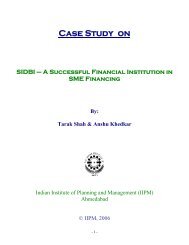
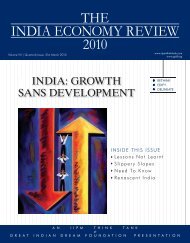
![[Feb 2008, Volume V Annual Issue] Pdf File size - The IIPM Think Tank](https://img.yumpu.com/43961117/1/190x245/feb-2008-volume-v-annual-issue-pdf-file-size-the-iipm-think-tank.jpg?quality=85)
![[June 2008, Volume V Quarterly Issue] Pdf File size - The IIPM Think ...](https://img.yumpu.com/41693247/1/190x245/june-2008-volume-v-quarterly-issue-pdf-file-size-the-iipm-think-.jpg?quality=85)
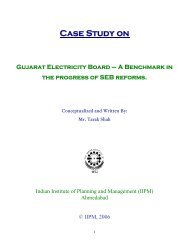

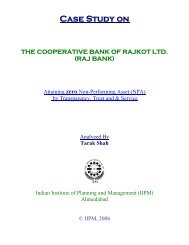

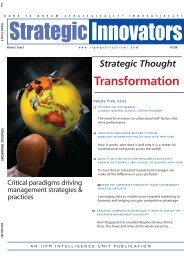
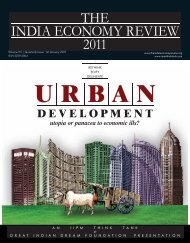
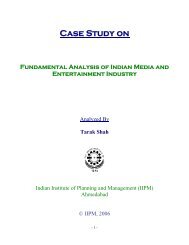
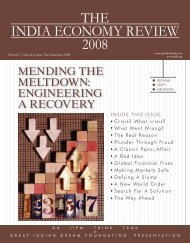
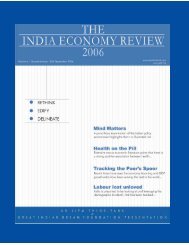
![[Volume VI | Quarterly Issue: 31st May 2009] Pdf File size](https://img.yumpu.com/27796051/1/190x245/volume-vi-quarterly-issue-31st-may-2009-pdf-file-size.jpg?quality=85)